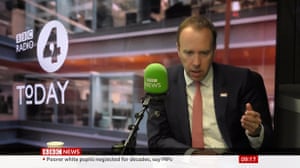
Good morning. Matt Hancock, the health secretary, has been giving interviews this morning, and it was a mixture of good news and bad news.
First, the good news, which was probably more salient. Echoing what other ministers have been saying in recent days, Hancock said England was still on track to lift all remaining restrictions on 19 July. But he also made an important point about the progress of the virus.
- Hancock said the growth rate in Covid cases was slowing. Asked what was happening now on Covid case rates on the Today programme, he said:
Well, we are seeing that growth in case rates is slowing.
Thankfully, the number of hospitalisations whilst rising is not rising very quickly.
And thankfully, even more, the number of people dying from Covid remains very, very low.
In Scotland, which is the worst affected part of the UK at the moment, their case rates have been rising somewhat earlier, somewhat more, than elsewhere in the UK. And there again, the number of people dying is not rising. This is encouraging.
That was the cheery bit. A bit more sobering was what he had to say when asked about the winter.
- Hancock would not rule out some restrictions having to be re-imposed in the winter. Asked on the Today programme if restrictions would have to come back in the winter, he replied:
I hope we don’t have to do that, and I hope that we can take the steps on the 19 July that are pencilled in for then because the data is looking encouraging. But then for the winter, I hope that with a booster shot we get that protection against Covid very, very high.
Hancock explained that this was partly because of the threat from flu. Asked to explain what Boris Johnson meant yesterday when he talked about the NHS facing a “rough winter”, Hancock said there was very little flu last winter because people were socially distancing. He went on:
We didn’t see any other communicable diseases last winter in any serious size at all, and so the clinical concern is that our immunity will be lower … Almost nobody has had flu now for 18 months in this country. Obviously that’s a good thing. But it does mean that the flu vaccination programme this autumn will be even more important … We do expect this winter to be challenging.
Here is the agenda for the day.
9.30am: Boris Johnson chairs cabinet.
9.30am: Nadine Dorries, a health minister, gives evidence to the Commons health committee on children and young people’s mental health.
9.30am: The ONS publishes its weekly death figures for England and Wales. It is also publishing figures on antibody levels in England, Scotland, Wales and Northern Ireland.
11am: Lord Frost, the Brexit minister, gives evidence to the Commons foreign affairs committee.
11.30am: Rishi Sunak, the chancellor takes questions in the Commons.
12.30pm: Nigel Huddleston, a culture minister, responds to an urgent question about the pilot programme for making large events Covid secure.
12pm: Downing Street is expected to hold its daily lobby briefing.
2pm: Nicola Sturgeon, Scotland’s first minister, makes a statement on Covid to the Scottish parliament.
Nicola Sturgeon
(@NicolaSturgeon)📺 I will make a statement to @ScotParl today (c 2.20pm) setting out the vaccine milestones we hope to reach over the summer and, based on those, the path we hope to take out of Covid restrictions and back to greater normality in our day to day lives. Please tune in if you can.
2pm: Andy Burnham, mayor of Greater Manchester, holds a press conference.
Politics Live has been a mix of Covid and non-Covid news recently and that is likely to be the case today. For more coronavirus developments, do follow our global Covid live blog.
I try to monitor the comments below the line (BTL) but it is impossible to read them all. If you have a direct question, do include “Andrew” in it somewhere and I’m more likely to find it. I do try to answer questions, and if they are of general interest, I will post the question and reply above the line (ATL), although I can’t promise to do this for everyone.
If you want to attract my attention quickly, it is probably better to use Twitter. I’m on @AndrewSparrow.
Alternatively, you can email me at andrew.sparrow@theguardian.com



